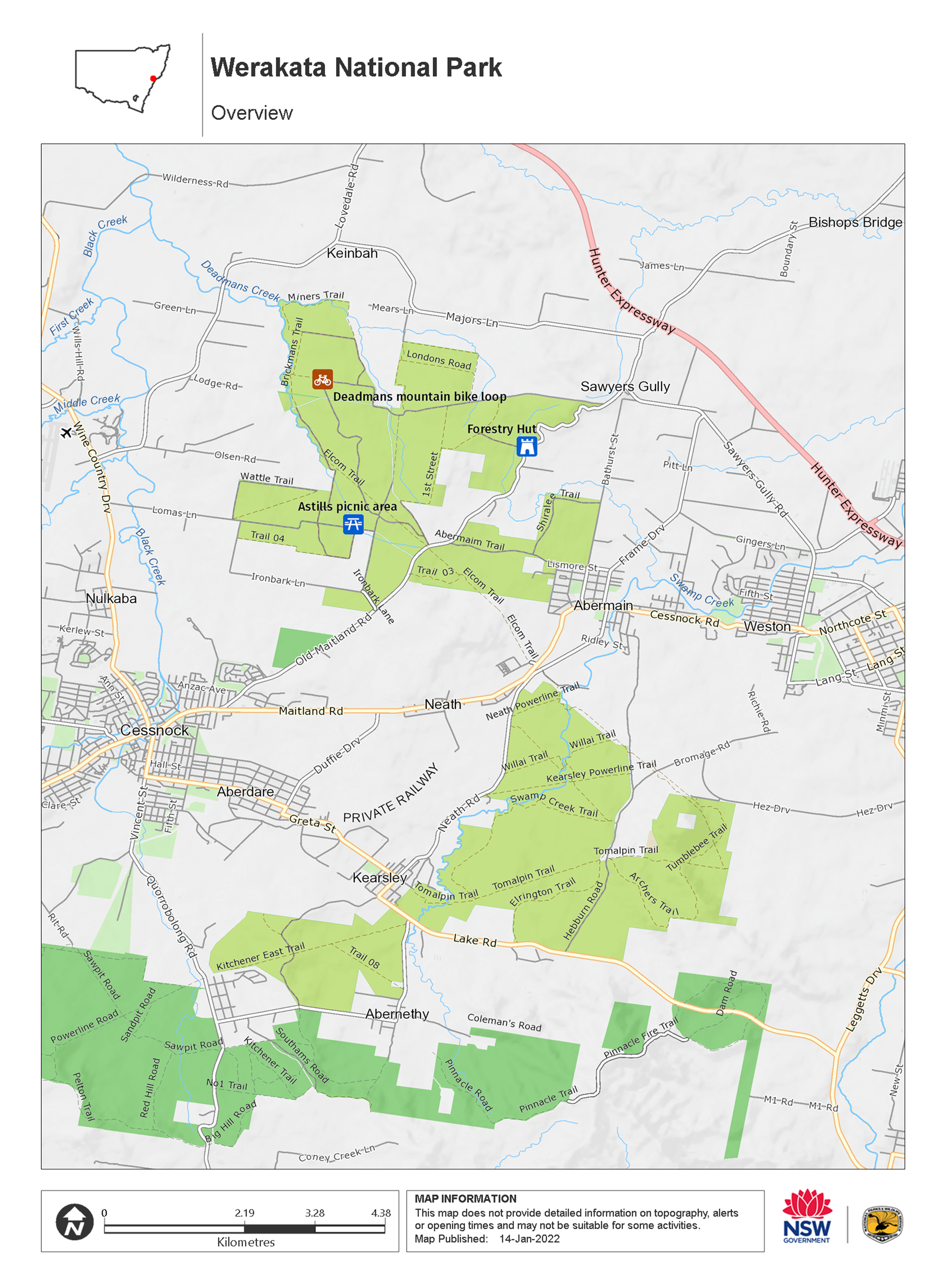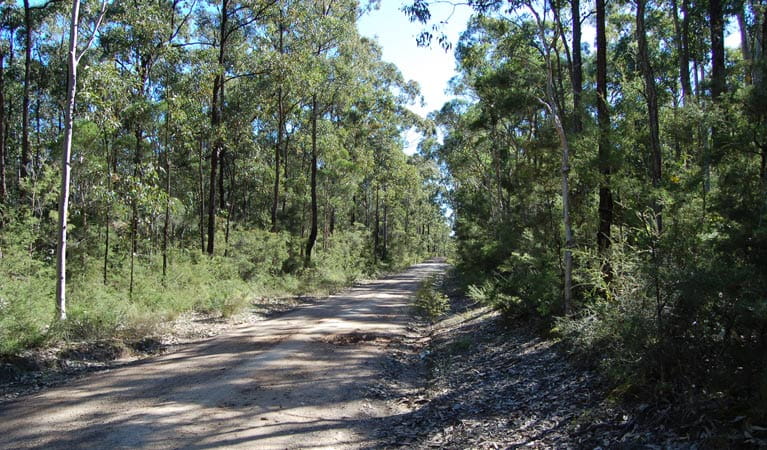Werakata National Park
Overview
Werakata National Park is great for birdwatching, home to native animals and has exceptional spring wildflowers. The riding trails and scenic picnic ground are real highlights..
Read more about Werakata National Park
Werakata National Park in the Lower Hunter Valley is loved by locals. It’s also close to Sydney, which makes for the perfect day trip. There are great cycling and walking trails and in spring they’re lined with purple, orange and yellow wildflowers, like acacias and banksias. There are rare plants here, found mostly in a special section of endangered habitat.
Bring some local Hunter Valley produce to the park and set up at pretty Astills picnic area. Then cycle along Deadmans mountain bike loop or Astills trail, which are both easy, flat and suitable for any fitness level.
Bring binoculars and a camera – you’ll find brightly coloured bush birds flying low enough for great photography. Birdwatchers who come to Werakata are never disappointed; the abundance of food in the park attracts the likes of the threatened swift parrot or regent honeyeater as well as several species of robin.
Local alerts
For the latest updates on fires, closures and other alerts in this area, see https://www.nationalparks.nsw.gov.au/visit-a-park/parks/werakata-national-park/local-alerts
Contact
- in the North Coast region
Werakata National Park is always open but may have to close at times due to poor weather or fire danger.
-
-
Newcastle office
02 4946 4100
Contact hours: Monday to Friday, 8.30am to 4.30pm. - 1 Wetlands Place, Shortland NSW 2307
-
Email: npws.lowerhunter@environment.nsw.gov.au
-
Newcastle office
Visitor info
All the practical information you need to know about Werakata National Park.
Map

Map legend

Getting there and parking
From Cessnock:
- Follow Maitland Road (B68) towards Abermain
- Turn left on Old Maitland Road at East Cessnock
- Turn left on Ironbark Lane
- Follow the signs to Astills picnic area
Parking
- Astills picnic area See on map
By bike
Check out the Bicycle information for NSW website for more information.
By public transport
For information about public transport options, visit the NSW country transport info website
Best times to visit
There are lots of great things waiting for you in Werakata National Park. Here are some of the highlights.
Autumn
The days are cooler but still sunny in autumn, making it a fabulous time for hitting the cycle trails of Werakata National Park. The Deadmans Loop trail and Astills trail offer easy flat, fun rides for the family.
Spring
There are more than 200 different types of animals recorded in Werakata National Park and the nearby State Conservation Area. Spring is a great time to see them. The wildflower displays during spring are a sight to behold .
Summer
Pack a picnic lunch and head for the Astills picnic area with its beautiful canopy of gums.
Winter
Winter is a great time for bird watching in the park. Werakata is blessed with a huge number of spotted gums, one of only a few winter-flowering eucalypts found near the New South Wales coast.
Facilities
Maps and downloads
Prohibited
Illegal dumping is prohibited and penalties apply. If you see illegal dumping activity please help NPWS by reporting it to Environment Line: 131 555.
Pets
Pets and domestic animals (other than certified assistance animals) are not permitted. Find out which regional parks allow dog walking and see the pets in parks policy for more information.
Smoking
NSW national parks are no smoking areas.
Nearby towns
Cessnock (6 km)
Some of the finest wines in the world are created in the Hunter Valley and its towns, gourmet food is acclaimed and luxury, boutique accommodations are matched by the most beautiful natural scenery.
Lovedale (6 km)
As a major Hunter Valley wine-producing area, Lovedale dates back to the early 1800s, when local wheat and general produce farmers turned to grape growing. The Lovedale Long Lunch is a two-day eating and drinking extravaganza. Sample gourmet foods from local restaurants and wines from Lovedale wineries and vineyards. Even if you miss the annual event, there's nothing stopping you from embarking on your own Lovedale long lunch!
Newcastle (49 km)
Newcastle is a harbour city surrounded by amazing surf beaches that are linked by a great coastal walk, the Bathers Way. The walk from Nobbys Beach to Merewether Beach takes about three hours and is a great way to explore the city.
Learn more
Werakata National Park is a special place. Here are just some of the reasons why:
Green in the valley

Conservation is a vital aspect of this national park. Check out Kurri sand swamp woodland and Hunter lowlands red gum forest, as they are home to endangered ecological communities. Werakata National Park has some special and endangered plants. Over 400 species of plants are known to exist here. Lower Hunter spotted gums and ironbark form part of the park's thick bushland, and are a rich source of food for the winter birds that flock here.
Blossoming with life

Spring wildflowers such as purple happy wanderer, yellow hairpin banksia and red mountain devil all bloom in Werakata National Park. There are also delicate ground orchids and lovely thyme honey myrtle sprinkled throughout the park. More than 200 native animal species have been recorded in the park and surrounds. You'll likely see tree-dwellers like gliders, possums and bats at night. Old favourites like wallabies can also be seen feasting on the luscious landscape. Lizards, like the common scaly-foot and Burton's snake lizard, might be a little harder to find, but keep looking. If you like birds, you’ll love Werakata. The abundance of ironbark and spotted gum, which flower in winter, attracts the threatened swift parrot and regent honeyeater. The trees’ blooms are an important winter food source for the birds and the park becomes a winter breeding ground. But there is a lot of birdlife all year round. Powerful owls, masked owls, various robins, and lorikeets can all be seen here, so be sure to bring your binoculars for some great bird watching.
- Deadmans mountain bike loop Deadmans mountain bike loop is an easy 8km cycle through rare Hunter Valley bushland. The trail starts near Astills picnic area and is a good choice for a family day trip.
Education resources (1)
What we're doing
Werakata National Park has management strategies in place to protect and conserve the values of this park. View the detailed park and fire management documents.

